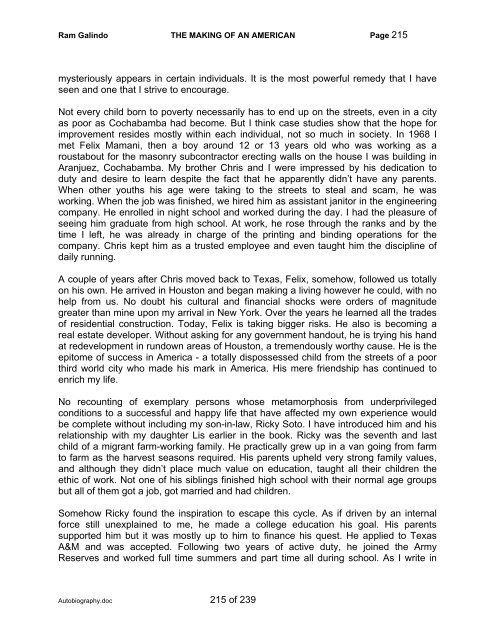Autobiography - The Galindo Group
Autobiography - The Galindo Group
Autobiography - The Galindo Group
Create successful ePaper yourself
Turn your PDF publications into a flip-book with our unique Google optimized e-Paper software.
Ram <strong>Galindo</strong> THE MAKING OF AN AMERICAN Page 215<br />
mysteriously appears in certain individuals. It is the most powerful remedy that I have<br />
seen and one that I strive to encourage.<br />
Not every child born to poverty necessarily has to end up on the streets, even in a city<br />
as poor as Cochabamba had become. But I think case studies show that the hope for<br />
improvement resides mostly within each individual, not so much in society. In 1968 I<br />
met Felix Mamani, then a boy around 12 or 13 years old who was working as a<br />
roustabout for the masonry subcontractor erecting walls on the house I was building in<br />
Aranjuez, Cochabamba. My brother Chris and I were impressed by his dedication to<br />
duty and desire to learn despite the fact that he apparently didn’t have any parents.<br />
When other youths his age were taking to the streets to steal and scam, he was<br />
working. When the job was finished, we hired him as assistant janitor in the engineering<br />
company. He enrolled in night school and worked during the day. I had the pleasure of<br />
seeing him graduate from high school. At work, he rose through the ranks and by the<br />
time I left, he was already in charge of the printing and binding operations for the<br />
company. Chris kept him as a trusted employee and even taught him the discipline of<br />
daily running.<br />
A couple of years after Chris moved back to Texas, Felix, somehow, followed us totally<br />
on his own. He arrived in Houston and began making a living however he could, with no<br />
help from us. No doubt his cultural and financial shocks were orders of magnitude<br />
greater than mine upon my arrival in New York. Over the years he learned all the trades<br />
of residential construction. Today, Felix is taking bigger risks. He also is becoming a<br />
real estate developer. Without asking for any government handout, he is trying his hand<br />
at redevelopment in rundown areas of Houston, a tremendously worthy cause. He is the<br />
epitome of success in America - a totally dispossessed child from the streets of a poor<br />
third world city who made his mark in America. His mere friendship has continued to<br />
enrich my life.<br />
No recounting of exemplary persons whose metamorphosis from underprivileged<br />
conditions to a successful and happy life that have affected my own experience would<br />
be complete without including my son-in-law, Ricky Soto. I have introduced him and his<br />
relationship with my daughter Lis earlier in the book. Ricky was the seventh and last<br />
child of a migrant farm-working family. He practically grew up in a van going from farm<br />
to farm as the harvest seasons required. His parents upheld very strong family values,<br />
and although they didn’t place much value on education, taught all their children the<br />
ethic of work. Not one of his siblings finished high school with their normal age groups<br />
but all of them got a job, got married and had children.<br />
Somehow Ricky found the inspiration to escape this cycle. As if driven by an internal<br />
force still unexplained to me, he made a college education his goal. His parents<br />
supported him but it was mostly up to him to finance his quest. He applied to Texas<br />
A&M and was accepted. Following two years of active duty, he joined the Army<br />
Reserves and worked full time summers and part time all during school. As I write in<br />
<strong>Autobiography</strong>.doc 215 of 239


